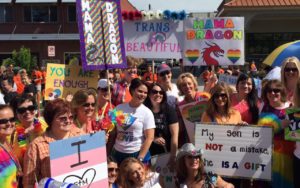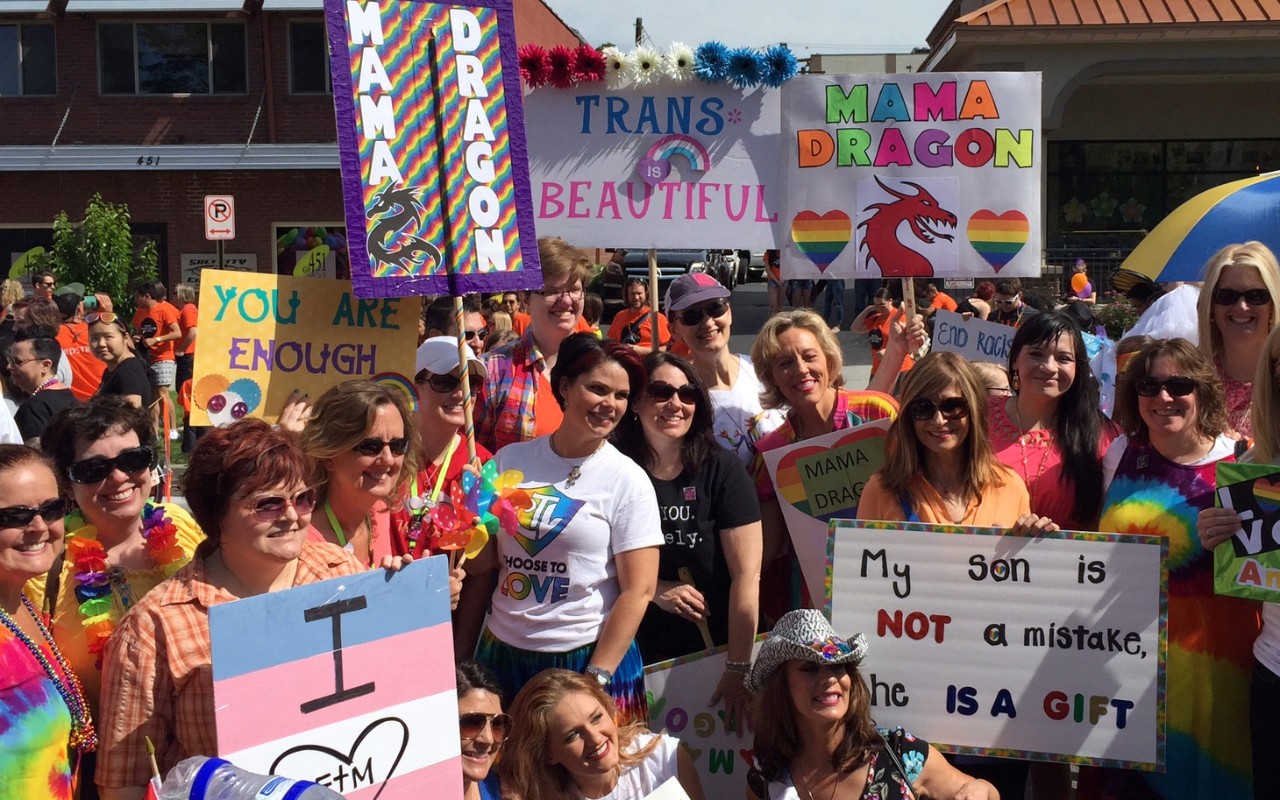 On Thursday afternoon, November 5th, 2015, a leak of new directives regarding LGBT Latter-day Saints was made public, kicking off a tumultuous year within many Mormon circles. What came to be known informally as “The Policy” required stake leaders to excommunicate for “apostasy” any Latter-day Saints who were in same-sex marriages regardless of their belief level in Mormonism and to withhold a baby blessing (which includes having that child entered into the records of the church), baptism, and priesthood ordination and advancement to any child or teen who lives in the home of a parent who is in a same-sex relationship, whether married or not. These directives, published in the church’s Handbook of Instructions to bishoprics and stake leaders, both astonished and struck many Latter-day Saints as flying in the face of their own spiritual sense of what is right and wrong, as well as what Christ would do. It seemed to them, at best, an institutional response (perhaps guided by attorneys who proposed possible legal exposure the church might have on various fronts without clarifying the status of married LGBT Latter-day Saints) to the U.S. Supreme Court ruling earlier in the year legalizing same-sex marriages throughout the country.
On Thursday afternoon, November 5th, 2015, a leak of new directives regarding LGBT Latter-day Saints was made public, kicking off a tumultuous year within many Mormon circles. What came to be known informally as “The Policy” required stake leaders to excommunicate for “apostasy” any Latter-day Saints who were in same-sex marriages regardless of their belief level in Mormonism and to withhold a baby blessing (which includes having that child entered into the records of the church), baptism, and priesthood ordination and advancement to any child or teen who lives in the home of a parent who is in a same-sex relationship, whether married or not. These directives, published in the church’s Handbook of Instructions to bishoprics and stake leaders, both astonished and struck many Latter-day Saints as flying in the face of their own spiritual sense of what is right and wrong, as well as what Christ would do. It seemed to them, at best, an institutional response (perhaps guided by attorneys who proposed possible legal exposure the church might have on various fronts without clarifying the status of married LGBT Latter-day Saints) to the U.S. Supreme Court ruling earlier in the year legalizing same-sex marriages throughout the country.
The year since “The Policy” offered several indications that the church was standing firm in its position, in one case even seeing the president of the Quorum of the Twelve Apostles referring to it as a “revelation,” but also both anecdotally and in some actions that came to be known publicly that it might be losing favor and status among the leading quorums.
In this two-part episode, a wonderful panel of church members—Jana Riess, Benjamin Knoll, Mitch Mayne, Laura Root, and Walt Wood—who have carefully watched from various and interesting vantage points the year unfold with regard to The Policy join Mormon Matters host Dan Wotherspoon. What is their sense of how things stand today? What signals are they seeing about the Policy’s waning? What do survey responses reveal about its reception within the church as a whole, and among members from various generations and other categories and life experiences? What do panelists feel about the long-term impact of The Policy within the church? Ultimately will it prove to a pivot point that will actually serve to move the church’s membership more quickly toward acceptance of LGBT members in full fellowship? What are the main sources for optimism about the direction things seem to be moving? How are they themselves maintaining energy to keep engaging in these conversations?
Please listen and then join in below with your own stories, observations and comments!
_____
Links: Forthcoming


Comments 8
This policy does not have the expected earmarks of revelation from God (as we have expected it to appear). WHen is was first leaked, the language of the policy was written (and still is written) on its face as applying to any child whose parent is in a gay relationship (whether the child lives with that parent or not). After Elder Christopherson gave his video “clarification” the scope of the policy was not limited. After the continued uproar was not quelled, the letter from the First Presidency, for the first time, explained that it only applied to children of gays living with their gay parent.
The policy is poorly written. Not something that seems inspired or authored by Deity. Nor is its spirit consistent with a loving God. The Church could have simply required written authorization from both parents to allow a child to participate in the Church. No need for such a blanket restriction. I believe that Jana makes a good point: the Bretheren simply cannot imagine that gay families and their kids should be able to sit in the congregation among the “normal” families, because their presence will breed acceptance and understanding.
But in my mind, there is no indication this is from God.
Laura, thank you for sharing your story with such openness. As a 40 year old never married woman in the church, albeit straight, I have also had to wrestle with God and come to peace that some of my deliberate life choices for greater happiness, relational fulfillment and individual development while not necessarily in line with the church’s teachings are right for me and where I am on the path. All of us following an unorthodox path know the pain of judgement and the sting from disappointing others. However, I wanted you to know that your story will resonate with and inspire many in the church as it did me. May you continue to find peace and happiness on your spiritual journey.
Thanks for another thoughtful discussion. I appreciate the wide variety on the panel. It makes for a better discussion.
I really liked Mitch’s comment toward the end giving some hope that some good will come out of this. I realized I may very well have fit into that category. Due to my faith crisis a bit before I already had made a change in my thinking, but without that faith crisis I might not have. But this policy would probably have jarred me into really thinking about the LGBT issue.
Pingback: The Policy a Year Later - Mormon Spectrum
Pingback: Sunday in Outer Blogness: Unhappy anniversary edition! – Main Street Plaza
I’m a long time MM listener, as well as a Gay man. I was never a Mormon, but I grew up in a conservative Catholic environment, so I can empathise with many of the topics of discussion.
However, I was deeply offended by this episode. I often find myself disagreeing with the positions expressed in the podcast but this time it really hit me.
Dan, you’re using the suffering and violence perpetrated against LGBT people for the sake of supporting your anachronistic positions vis à vis the mormone Church. I can’t otherwise explain the joy you feel at knowing that a very small minority of Mormons thinks non straight relationships in society. In what twisted reality is this a good result or anything to boast about? I get it, you’re trying to see the glass half full. But by doing this, you’re trivialising the suffering of lgtb people, and of those who are not strong enough to come in your podcast or to suffer the daily harassment that lgtb folks are subject to, everyday, in conservative churches.
No wonders few LGBT people feel that ‘love and compassion’ of this ‘beautiful community’ the 80% of which feels like they should be totally rejected by society.
The rethoric in the podcast is disgraceful, and really hurts people who experience discrimination and marginalisation by the hand of their religious community. And the worst part feels like this is all on the table for the spiritual elation of you and your guests, lgbt people being nothing but the instrument of this. The whole thing was jaw-dropping out of touch, and I do hope that you and yours reconsider your narrative and the way you put it out.
Giuseppe, I am a little confused by your comment. I would perhaps agree that Dan and the others have more optimism than I have on this subject–but I thought they expressed their unhappiness with the policy and had some criticisms of the website as well. I think Mitch Mayne and Walt are in unique areas where leaders are seeking their experience and suggestions on these issues but I would say in my experience more of the church culture is very rigid, top-down authoritarian, very much “love the sinner, hate the sin” mindset which would translate into seeking out people to excommunicate or disfellowship. I mean, look how we dutifully and thoroughly we embraced the white shirt and no caffeine suggestions.
Sadly, when I look at the twelve apostle roster I am not optimistic for any significant change for the near future.
And, with grooming all these missionaries at even younger ages I think the rigidity will continue for quite some time.
Thanks to Dan and all the participants for this interesting conversation.
what I’m talking about is all the love and compassion that only Dan and his friends seem to find in the church. Slamming that in the face of lgbt people while saying (repeatedly) ‘change is on its way, we just have to wait for all the baby boomers to die’ borders denial.
And while Dan finds continuous strength and inspiration in these stories, and is patient and ‘nuanced’, people are hurt.